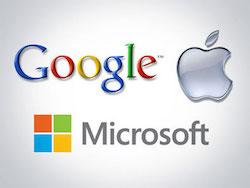 There are indications that over the coming decade, the effective use of intelligent assistants in the enterprise could be a key differentiator for businesses and for the executives and employees who use them. What will intelligent assistants in the enterprise look like? How will they be similar to or different from today’s personal intelligent assistants? Who will be the key players in offering these solutions?
There are indications that over the coming decade, the effective use of intelligent assistants in the enterprise could be a key differentiator for businesses and for the executives and employees who use them. What will intelligent assistants in the enterprise look like? How will they be similar to or different from today’s personal intelligent assistants? Who will be the key players in offering these solutions?
Some indication of what the future holds for enterprise intelligent assistance is already taking place. Key players investing in the underlying technologies today are Google, Microsoft, and Apple. Each company covets the enterprise customer, even if their core marketing efforts may be focused on the consumer space.
In a recent article at PCmag.com, Michael J. Miller provided a good summary of the current posture these vendors are taking with regard to their personal assistant offerings: Google Now, Cortana, and Siri, respectively. Each of these companies are devoting significant research and development to improve their assistants and further embed them into their application ecosystem.
Miller points out that voice recognition has significantly improved, presumably helped along by the increase in usage and the resulting treasure trove of voice data. But perhaps more importantly, vendors are deep linking their assistants into their operating systems and applications. This linkage enables intelligent assistants to surmise what you’re doing and proactively offer relevant information or help.
For example, when you receive a text message from your spouse asking you to pick up the dry cleaning on your way home, Google’s “Now on Tap” capability will set a reminder for you. Apple’s Proactive can learn about your usage habits and predict what apps or information you need to see before you even ask. Microsoft is weaving Cortana into a cross-platform operating system that will enable the assistant to perform all kinds of useful functions.
It doesn’t take a huge leap of imagination to envision a point in the near future when these smart assistants are able to help us be better at our jobs. Having my smartphone remind me to pick up the dry cleaning is nice. Having my intelligent assistant remind me to respond to an email from my boss could save my job. A personal assistant that can notify me about traffic on my usual route home is helpful. An assistant that can alert me to a drop in sales in a key region, before it’s too late for me to do something about it, can propel me and my company to success.
Are personal assistants destined for the enterprise? Will Google, Apple, and Microsoft be the companies offering these solutions, or will they come from more traditional enterprise application and enterprise services players? We’ll certainly be watching to find out.
To learn more about the future of enterprise intelligent assistance, and to participate in the conversation, be sure to check out the “Intelligent Assistants Developers and Implementers” group at LinkedIn.
Categories: Intelligent Assistants, Articles

 Getting It Right: What AI Agents Actually Mean for Customer Support (Webinar)
Getting It Right: What AI Agents Actually Mean for Customer Support (Webinar)  Beyond the Basics: How AI Is Transforming B2B Sales at TP
Beyond the Basics: How AI Is Transforming B2B Sales at TP  Five9 Launches Agentic CX: Toward AI Agents That Reason and Act
Five9 Launches Agentic CX: Toward AI Agents That Reason and Act  2025 Conversational AI Intelliview: Decision-Makers Guide to Self-Service & Enterprise Intelligent Assistants
2025 Conversational AI Intelliview: Decision-Makers Guide to Self-Service & Enterprise Intelligent Assistants